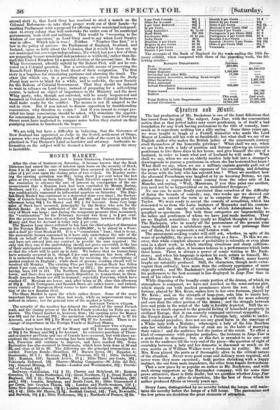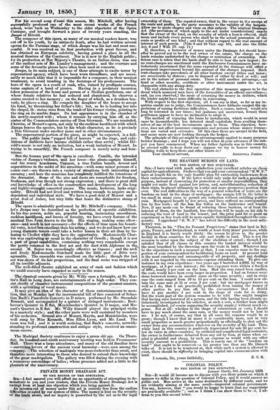Drury Lane, distin g uished by no novelty behind the lamps, still
main- tains the novelty before the lamps of a full house. The pantomime and the low prices are doubtless the great elements of attraction,
For his second coup d'essai this season, Mr. Mitchell, after having successfully produced one of the most recent works of the French
school, went back on Wednesday to the older repertoire of the Opera Comique, and brought forward a piece of twenty years standing, the Zampa of Herold.
The composer of this opera, as many of our musical readers know, was cut off in his youth, by an untimely death, after he had written several
operas for the Parisian stage, of which Zampa was his last and most suc- cessful. It was received on its first production with great favour, and has obtained an European celebrity, having gained a place in all the musical theatres of the Continent, Nor is it new to the English public ; fur its production at Her Majesty's Theatre, in an Italian dress, was one of the earliest acts of Mr. Lumley's management; and the overture and some of the favourite pieces have often been used at concerts.
Zampa, in its main subject, is one of those attempts to excite terror by supernatural agency, which have been worn threadbare, and are neces- sarily so much alike that it is impossible for a composer, in their musical treatment, to avoid treading in the footsteps of his predecessors. The hero of the opera is a youth of rank, who, ruined by profligate courses,
turns captain of a band of pirates. Having in a predatory incursion taken possession of the house and person of a Sicilian gentleman, one of whose female relatives he had seduced and abandoned, he observes a statue erected to her memory ; on the finger of which, as a drunken bra- vado, he places a ring. He compels the daughter of the house to accept his hand, by threatening her father's life ; but, as he is leading her into the chapel, th statue rises from the tomb of his former victim, pointing to the ring on its marble finger. Its last appearance is in the chamber of his newly-married wife ; whom it rescues by carrying him o1 as the statue of the Commendatore carries off Don Giovanni. We are reminded, 1 keivii3e, of Mozart's opera, not only by the reckless hardihood with which Zampa braves the spectre, but by his whole character, as he is precisely a Don Giovanni under another name and in other circumstances.
The supernatural portion of the piece, as might be expected, is a fail- ure. The public have "supped full of horrors " on the stage, and exhi- bitions of diablerie have become childish rather than awful; whilst He- rald's music is not only an imitation, but a weak imitation of Mozart. In trying to be unearthly, the French composer is merely noisy and bois- terous.
But the human part of the opera is excellent. Camille, the intended victim of Zampa's violence, and her lover—the pirate-captain himself, and his trusty henchman, Capuzzi, a true Italian bandit, devout and superstitious in the midst of his atrocities—with some minor persons of a comic cast—are thrown into a variety of situations both interesting and
amusina.' ; and here the musician has completely fulfilled the intentions of
the dramatist. Some of the airs and duets are remarkable for freedom, freshness, and true though not strong expression ; and there is great skill and knowledge of effect in the construction and development of the long and highly-wrought concerted pieces. The music, however, lacks origi- nality. Herold had not lived and written long enough to acquire an in-
dependent and individual style. We have a good deal of Mozart and a great deal of Auber, but very little that bears the distinctive stamp of Herold.
The opera is admirably performed by Mr. Mitchell's company. Chol- let's Zampa may be described aa the perfection of operatic exhibition. In his fine person, noble air, greiceful bearing, insinuating smoothness,
reckless hardihood, and bursts of ferocity, we have every feature of the nautical Don Juan drawn to the life. His singing, making some allow- ance—and much is not necessary—for the effects of time upon his beauti- ful voice, is not less excellent than his acting ; and we do not know how our young dramatic tenors could take a better lesson in their art than by lis- tening to Chollet while they have the opportunity. Mademoiselle Char-
ton was captivating as usual in the character of Camille; though it is not a part of great capabilities, containing nothing very remarkable except the pretty romance in the first act and the duet with Alphonse in the second. M. Soper was exceedingly effective as Capuzzi ; and the arch and lively Mademoiselle Guichard made the little part of Bata very
agreeable. The ensemble was excellent on the whole ; though the last not was shorn of its fair proportions, and the final scene was stripped of all its terrible adjuncts.
The well-filled theatre exhibited an array of rank and fashion which we could scarcely have expected so early in the season.



























 Previous page
Previous page